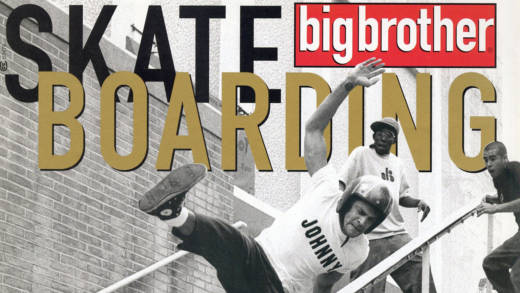It wasn't just the Big Brother skate videos that were nuts, Big Brother magazine made National Lampoon look like Disney Adventures. (Chris Pontius wrote for it, Steve-O literally set his face on fire to get in the magazine, and Jason "Wee Man" Acuña was the subscription manager.) It was less about skateboarding and more about self-consciously trying to offend—which is why there were news stories warning parents about the dangers of Big Brother, and why it ended up being owned by Hustler-founder and First Amendment fan, Larry Flynt.
Truly, in the pre-internet age, Big Brother was a dark entity. It was a window into the most self-destructive, nihilistic elements of skateboarding. It was uncomfortable to read. There were graphic depictions of bodily fluids and rampant, full frontal nudity. It was sometimes homophobic and frequently sexist. Its "KIDS ISSUE" had a cover designed to appeal to children, but articles about bestiality and BDSM inside. Instructions on how to take drugs and how to commit suicide were featured. Big Brother embraced every taboo possible in the same decade that political correctness became a thing, and thrived both because, and in spite, of it.
When Big Brother first emerged in 1992, the shadier, dirtier, riskier elements of skating were already well-established (thanks in no small part to what was happening in the Bay Area in the late '80s and early '90s). Big Brother just did more to shine a light on them than anyone else ever had, and subsequently managed to push skateboarding's focus almost entirely in that direction—at least for a few years. The more sexual and offensive content there was in the magazine, the more the entire skateboard industry embraced shock value.
As previously stated, without Big Brother, there would have been no Jackass. And without Jackass, the boundaries of how ridiculous and dangerous you can be on television and in movies would not be where they are now. Actor Jonah Hill, speaking in the Dumb documentary, describes Big Brother as his "biggest influence comedically" because it made him think "humor could be cool, because it could be dangerous." In the world of print, one has to wonder if men's magazines like Maxim (launched 1995) and FHM (launched 1999) would have had the idea of incorporating so much unclothed female flesh into non-related and mainstream content if Big Brother hadn't done it first.
One of the great ironies of Big Brother is that it helped create the environment that caused the boom in skateboarding in the late '90s and early 2000s, but was simultaneously destroyed because of it. Once skating hit the mainstream—thanks in part to the growing success of the X Games—skate companies, wishing to cultivate an air of respectability, couldn't get away from Big Brother fast enough. And without advertising dollars, the magazine was doomed.
In the post-internet age, it's difficult to imagine anything being able to shock quite like Big Brother did in its heyday—but Big Brother is also an indelible part of why we, as a culture, are inherently less shockable now.


